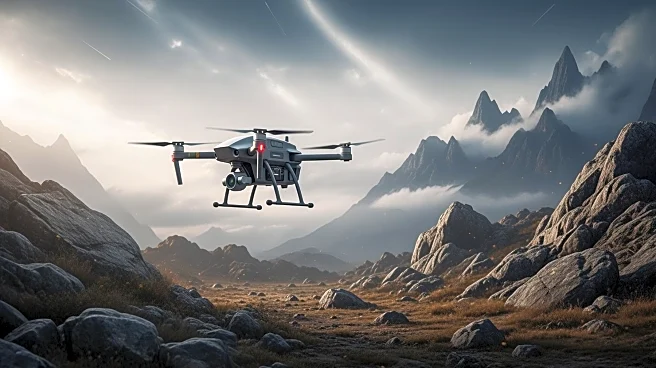What's Happening?
The United Kingdom has delivered over 85,000 unmanned aircraft systems (UASs) to Ukraine in the past six months, as announced by UK Secretary of State for Defence John Healey. This delivery is part of a larger commitment made by the UK to supply Ukraine with
100,000 UAVs by April 2026. The initiative is backed by a GBP350 million investment into unmanned systems for Ukraine. The UASs include short-range first-person view (FPV) UAVs, precision attack UAVs, interceptor UAVs for air defense, and new fiber-optic UAVs. Additionally, the UK and Ukraine have signed an industrial partnership, launching their first joint project named Octopus, which focuses on developing interceptor UAVs using data from the Ukrainian battlefield.
Why It's Important?
The delivery of UASs to Ukraine is a significant move in the ongoing conflict, enhancing Ukraine's defense capabilities against Russian aggression. The UAVs are expected to improve precision attacks and air defense, potentially altering the dynamics of the conflict. This support underscores the UK's commitment to Ukraine's sovereignty and its strategic partnership in defense technology. The industrial partnership between the UK and Ukraine could lead to advancements in UAV technology, benefiting both nations' defense sectors. The investment also highlights the growing importance of unmanned systems in modern warfare, potentially influencing future military strategies and defense policies globally.
What's Next?
The UK plans to continue its support by delivering thousands of improved interceptor UAVs monthly to Ukraine. This ongoing supply is expected to bolster Ukraine's defense capabilities further. The industrial partnership may lead to more collaborative projects, enhancing technological innovation in UAV development. As the conflict persists, other nations might increase their support for Ukraine, potentially leading to more international collaborations in defense technology. The situation may also prompt discussions on the ethical implications of using unmanned systems in warfare, influencing future regulations and policies.
Beyond the Headlines
The use of unmanned systems in warfare raises ethical and legal questions about the conduct of war and the role of technology in military operations. The reliance on UAVs could lead to shifts in military strategies, emphasizing remote warfare and reducing human casualties. This development might also impact global defense policies, as nations reassess their military capabilities and investments in unmanned systems. The partnership between the UK and Ukraine could serve as a model for international collaboration in defense technology, potentially leading to more joint ventures and innovations in the sector.















